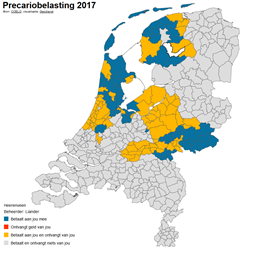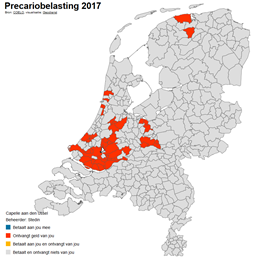Inwoners Tytsjerksteradiel betalen belasting aan Rotterdam
In veel gemeenten betalen inwoners via de beheerder van het energienetwerk ongemerkt belasting aan andere gemeenten, waar ze misschien wel nooit komen. Dat gebeurt via precariobelasting op leidingen: een verborgen belasting die huishoudens via de netbeheerders betalen. Vandaag publiceert COELO een interactieve kaart waarmee iedereen kan zien aan welke gemeente(n) hij meebetaalt of welke inwoners betalen voor de voorzieningen in zijn gemeente. Deze is te vinden op www.coelo.nl
Gemeenten kunnen precariobelasting heffen op ondergrondse water-, gas- en elektriciteitsleidingen. Drinkwaterbedrijven mogen deze kosten rechtstreeks in rekening brengen bij hun klanten in de heffende gemeente. De beheerders van het energienetwerk moeten de kosten echter verdelen over álle klanten, ook als die wonen in een gemeente die helemaal geen precariobelasting op leidingen heft.
Interactieve kaarten
Op de interactieve kaarten van COELO wordt voor elke gemeente in beeld gebracht aan welke andere gemeenten de inwoners belasting moeten betalen. Ook is te zien in welke andere gemeenten de inwoners meebetalen aan de voorzieningen in de eigen gemeente. Inwoners uit bijvoorbeeld Ameland, Alphen aan den Rijn en Aalten betalen mee aan de belasting van Heerenveen (zie afbeelding 1).

- Inwoners blauwe gemeenten betalen belasting aan Heerenveen;
- Inwoners gele gemeenten betalen belasting aan en ontvangen belasting van Heerenveen.
- Inwoners grijze gemeenten betalen niets aan en ontvangen niet van Heerenveen.
En inwoners van bijvoorbeeld Capelle aan den IJssel betalen aan onder meer Rotterdam, Dongeradeel en Veenendaal terwijl de gemeente zelf geen precariobelasting heft (zie afbeelding).

- Rode gemeenten ontvangen belastinggeld uit Capelle aan den IJssel
- Inwoners grijze gemeenten betalen niets aan en ontvangen niet van Capelle aan den IJssel.
Onzichtbare belasting
Precariobelasting is een onzichtbare belasting. Inwoners beseffen niet dat zij deze belasting betalen en weten al helemaal niet dat zij vaak meebetalen aan de voorzieningen van gemeenten die misschien wel aan de andere kant van het land liggen. Belastingbetalers mogen dus niet altijd meestemmen over de hoogte van de belasting die ze betalen. Dat is niet erg democratisch, en leidt niet tot een goede afweging van belastinggeld tegen de baten van gemeentelijke voorzieningen.
Wetsvoorstel afschaffing
De rijksoverheid is al meer dan tien jaar bezig om precariobelasting op ondergrondse leidingen af te schaffen. Ondertussen is het aantal heffende gemeenten gegroeid. De Tweede Kamer stemt binnenkort over een wetsvoorstel om precario op leidingen in 10 jaar af te schaffen. Tarieven mogen in die tien jaar niet worden verhoogd. Gemeenten die de belasting niet heffen in 2016 mogen deze niet meer invoeren.
Beheerders
Tennet en de Gasunie zijn nationale netbeheerders. Beide betalen precariobelasting op leidingen. De Gasunie zegt niet om welk bedrag het gaat. Het bedrag dat huishoudens betalen via Tennet is verwaarloosbaar klein (minder dan 25 cent per huishouden).
Er zijn zeven regionale netbeheerders. Drie regionale beheerders hebben geen precarioaanslag ontvangen. Van de andere vier rekent één (Enexis) nog geen kosten door omdat de beheerder bezwaar maakt tegen de ontvangen aanslagen. Huishoudens in de gebieden van Liander, Stedin of Enduris betalen via de energierekening wel precariobelasting op ondergrondse leidingen. Het gaat vaak om enkele tientjes per jaar.
Meer informatie
- Dr. C. Hoeben, onderzoeker COELO
- Een interactieve kaart waarop u kunt zien of inwoners van uw gemeente meebetalen aan andere gemeenten is te vinden op www.coelo.nl.
________________________________________________
> Meer nieuws van de Faculteit Economie en Bedrijfskunde
> FEB-experts in de media


Meer nieuws
-
10 februari 2026
‘Regeneratie begint waar moed en verbeeldingskracht samenkomen’
-
09 december 2025
Zijn robots de oplossing?
